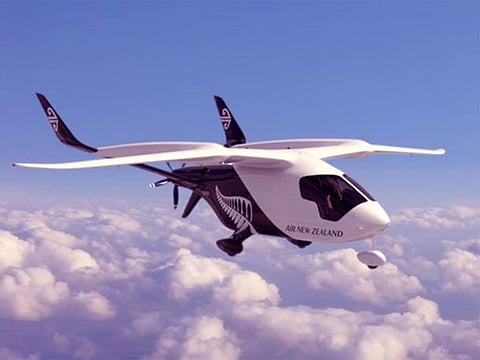Air New Zealand aims to fly battery-powered plane by 2026
The national airline said it has ordered an electric ALIA aircraft from Beta Technologies

Wellington: Air New Zealand said Wednesday it aims to become the first airline to fly an electric plane after announcing plans to have a battery-powered aircraft join its fleet in 2026.
The national airline said it has ordered an electric ALIA aircraft from US-based aerospace manufacturer Beta Technologies.
It is expected to join Air New Zealand's fleet initially as a cargo-only service flying packages and letters on domestic routes in partnership with New Zealand Post.
"We're aiming to be the first airline to fly a next-generation aircraft commercially," Air New Zealand Chief Sustainability Officer Kiri Hannifin told AFP.
She added that New Zealand's national carrier does not yet have a date when they will be able to offer passenger flights on battery-powered planes.
Scandinavian Airlines announced plans last May to carry customers on its first commercial electric flights in 2028.
Air New Zealand said in a statement that the battery-powered ALIA can be fully recharged in around an hour. It will land and take off like a conventional aircraft.
As with electric cars, the distance the plane can cover is key.
Roughly 12 metres long and weighing three tonnes, the ALIA has covered distances of 480 kilometres (298 miles) in a single test flight, the airline said. Its top speed is 270 kilometres an hour and can fly at an altitude of up to 3,000 metres.
For initial flights, after being certified as safe to fly, it will be used for routes of around 150 kilometres. Air New Zealand has ordered one electric plane with the right to buy up to nearly two dozen more.
Chief executive Greg Foran says the purchase is part of the airline's commitment to flying aircraft in New Zealand with lower emissions.
"Next-generation aircraft has the potential to decarbonise our regional operations," Foran told reporters in Auckland. "This purchase marks a new chapter for the airline."
He hopes flying the ALIA will "advance our knowledge" in order for Air New Zealand to be able to fly larger next-generation aircraft from 2030.
The airline expects to say which airports could be home to the ALIA in early 2024.
Sign up for the Daily Briefing
Get the latest news and updates straight to your inbox








